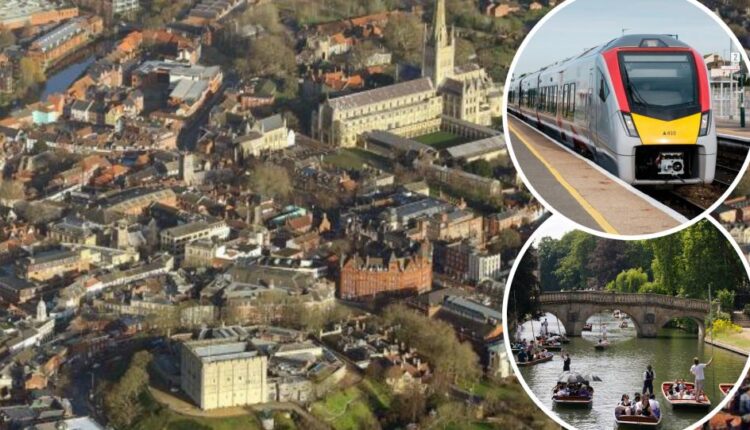Leaders call for direct trains from Norwich to Oxford.
A cross-country train connection between Norwich and Oxford should be one of the region’s top transport goals, according to a powerful coalition of council and industry leaders.
They say that the project would bring significant economic advantages to the region and could be completed by adding a Norfolk leg to an existing scheme to rebuild the line between Cambridge and Oxford.
Campaigners say the East West rail scheme should extend to Norwich(Image: Mike Page)
According to a new analysis by Transport East, a powerful regional advocacy group, there is a “compelling case” for both the Norwich and Ipswich extensions.
The Norfolk leg would necessitate an upgrading to the current line to Cambridge, including extensive work at Ely Junction and Trowse near Norwich, to allow additional services to go directly to Oxford.
The existing East West Rail project, which connects the Oxbridge cities, is now anticipated to cost between £5.7 billion and £6.6 billion in public funds.
Campaigners want better train services for Norfolk and Suffolk(Image: Greater Anglia)
The first phase, between Oxford and Bicester, has already opened with work on the next phase expected within the next year.
The project is viewed as providing significant economic benefits to the country by connecting its two major university cities and creating additional housing opportunities.
By expanding it to Norwich, Transport East claims that the scheme’s benefits will be enhanced and distributed more extensively, assisting Norfolk’s booming financial, creative, and life science sectors, especially those at Norwich’s Research Park, to develop.
According to the organisation, the region’s potential, which includes the Norwich to Cambridge tech corridor and the prospects given by renewable energy to places such as Great Yarmouth and Lowestoft, is being hampered by weak East-West transit connections.
Constraints on rail services in the East of England(Image: Transport East)
They argue that greater rail linkages, especially more frequent trains to Cambridge and beyond, are critical to realising that potential and ending a lack of possibilities for thousands of individuals.
The Crown Point railway depot in Norwich(Image: Mike Page)
They want the government to invest in improving connections to the “major economic centres” of Norwich and Ipswich.
That includes addressing the bottleneck at the Ely intersection, which is now at capacity. Improvements there would allow for greater passenger services as well as increased freight traffic from the ports.
Ely junction(Image: National Rail)
The previous government stated that changes would be undertaken but did not provide financing. The Labour government has not announced any funding either.
The paper also emphasises how Norfolk communities such as Thetford, Attleborough, and Wymondham are poised for “significant growth” and how enhanced rail services would assist commuters in getting to work.
A steam engine crosses the bridge at Trowse(Image: Mike Page)
It also refers to capacity constraints at Trowse Bridge and the junction on the approaches to Norwich station, which limit the number of services available to the city. A new bridge may be required to remedy that issue.
Amy Griffiths(Image: The Feed)
Amy Griffiths, Norfolk business board representative for Transport East, stated, “Norfolk is a powerhouse of innovation and enterprise, from Norwich’s thriving financial, creative, and life sciences sectors to the fast-growing Cambridge-Norwich Tech Corridor, which is expected to create thousands of jobs and generate £7 billion in annual GVA (gross value added) by 2031.
“This future economy requires infrastructure assistance to enable our talented individuals to seize these new opportunities and spread the benefits throughout our communities.
“Strengthening rail links between Norwich, Cambridge and the wider East West Rail network is vital to unlocking this growth, attracting further investment, improving productivity and sustainably connecting communities.”
Campaigners want the East West train enhancements to be extended into Norfolk and Suffolk (Image:
Transport East). More than 60 people attended an event to announce the study.
Alexander Nicoll(Image: Suffolk County Council)
Alexander Nicoll, chairman of the East West Rail Eastern Section Board and a Suffolk county councillor, stated, “This analysis makes a compelling case for why greater rail linkages in the east are critical to our future.
“We have a real opportunity now, while work is progressing on bringing East West Rail to Cambridge, to make the rail infrastructure improvements needed to maximise the value of government’s committed investment.”
These enhancements aim to bring the advantages of more frequent, dependable, and faster train service to communities and companies throughout the east.” The calls have been echoed by executives at Greater Anglia, which operates numerous rail routes in Norfolk and Suffolk.
Jonathan Denby, Greater Anglia’s head of corporate affairs (Photo: Archant)
“Evidence from evolving passenger demand across our network shows that where you improve train service frequency and service quality, more people choose to travel by rail,” stated Jonathan Denby, head of corporate relations at Greater Anglia.
“We’ve observed that with trends on regional routes like Norwich to Sheringham and Ipswich to Lowestoft, as well as on major ones like the Stansted Express and the Norwich to London intercity line.
As a result, we are dedicated to collaborating with regional partners to advocate for the pipeline of infrastructure upgrades required to enable additional routes to operate between Cambridge and Ipswich, Norwich, and north Essex, with all the advantages that would result for clients and communities.”
Read more on Straightwinfortoday.com


Comments are closed, but trackbacks and pingbacks are open.